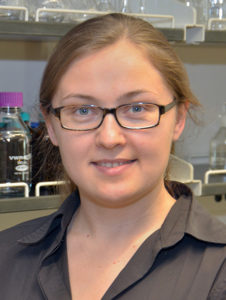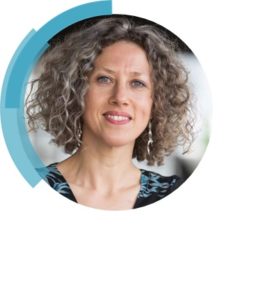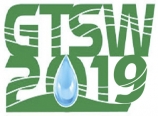 Dr. Olya Keen received her B.S. and M.S. degrees in civil and environmental engineering from the University of South Florida in 2008, and her Ph.D. from the University of Colorado at Boulder in 2012. She has been an Assistant Professor in the Department of Civil and Environmental Engineering at the University of North Carolina at Charlotte since 2013. Her research interests are contaminants of emerging concern, UV-based treatment technologies, especially advanced oxidation, and water reuse.
Dr. Olya Keen received her B.S. and M.S. degrees in civil and environmental engineering from the University of South Florida in 2008, and her Ph.D. from the University of Colorado at Boulder in 2012. She has been an Assistant Professor in the Department of Civil and Environmental Engineering at the University of North Carolina at Charlotte since 2013. Her research interests are contaminants of emerging concern, UV-based treatment technologies, especially advanced oxidation, and water reuse.
Read her Emerging Investigator article “Transformation of common antibiotics during water disinfection with chlorine and formation of antibacterially active products” and read more about him in the interview below:
Your recent Emerging Investigator Series paper focuses on Transformation of common antibiotics during water disinfection with chlorine and formation of antibacterially active products. How has your research evolved from your first article to this most recent article?
My very first article was on biodegradability of the products of carbamazepine (a pharmaceutical) after advanced oxidation. Essentially, my work continues to focus on the transformation products of pharmaceuticals. Trace pollutants of emerging concern, and especially pharmaceuticals, sparked my interest when I learned about them as an undergraduate student. When I decided to get a PhD, my aim was specifically to research this topic. I haven’t lost my interest in it since. There is still a lot to learn about the fate of pharmaceuticals and their transformation products in water and wastewater treatment processes, their human and environmental health effects at trace levels, and whether and how to control their concentrations in water resources. While this paper is very close in the topic to my first paper, I have since studied a number of topics with the ultimate goal to develop a strategy for keeping pharmaceuticals from water resources. I have investigated the impacts of hospital wastewater on antibiotics and antibiotic resistance genes in wastewater collection systems, have researched how the disposal of pharmaceuticals into solid waste from households and hospitals can impact water resources via landfill leachate, and examined the fate of some pharmaceuticals in environmental buffers used in potable water reuse. I have also been delving into other categories of contaminants of emerging concern (plasticizers, flame retardants, algal toxins, etc.) with some of my ongoing research.
What aspect of your work are you most excited about at the moment?
I am looking forward to continuing my work with the antibiotic transformation products we identified in this most recent publication and in some of the earlier papers. We plan to study their occurrence in full-scale treatment processes and their role in the development of antibiotic resistance.
In your opinion, what are the most important questions to be asked/answered in this field of research?
I think one of the most concerning pharmaceutical classes in water resources is antibiotics. More and more evidence comes out that environmental levels of antibiotics play a role in antibiotic resistance development. The most urgent question is how to control the release of antimicrobial substances (non-matabolized fraction of antibiotics, antibacterial substances in soaps, etc.) into the environment in a way that is economical to wastewater treatment plants and that doesn’t generate new substances of concern, e.g. antibiotic transformation products.
What do you find most challenging about your research?
The part of my research that involves work with transformation products is challenging for a number of reasons. Their definitive identification, and determining whether we should be concerned about them, is not an easy process and involves significant analytical research. Often projects don’t have a sufficient budget or a timeline for research as thorough as I would like it to be.
In which upcoming conferences or events may our readers meet you?
I am planning to attend IUVA 2020 conference in Orlando and the next AEESP conference in 2021. I also periodically attend national ACS meetings.
How do you spend your spare time?
I have a toddler, so I only daydream about spare time. I do enjoy spending time with my family. If I had a bit more spare time, I would use it to travel the world, read, and pursue painting.
Which profession would you choose if you were not a scientist?
I have a bit of an idealistic view of sustainable and organic farm living, and I sometime picture myself doing that. This is what my ancestors did for generations. My parents farmed in addition to their jobs when I was growing up, and now they are doing it full time in retirement. It amazes me, how little waste they generate by living the way they do and the kind of life skills they have. I hope to eventually teach my kid the knowledge of the traditional ways to make our own food and to live a truly low-impact and sustainable existence.
Can you share one piece of career-related advice or wisdom with other early career scientists?
Have one day a week for which you do not schedule any classes or meetings. It can be difficult to maintain focus on a paper or a proposal when the whole day is fractionated by various short-duration items. Creative thinking on a topic takes getting immersed into it for hours, chasing a thought and then the next thought that it leads to, and so on. Try to schedule most of the meetings on a single day. That day will be draining, but if split into several days, it will result in several draining days with seemingly nothing accomplished. Wise time management is a must, as the to-do list is never cleared, and it is easy to get overwhelmed and to feel like there is never any time to get things done no matter how long the hours.















